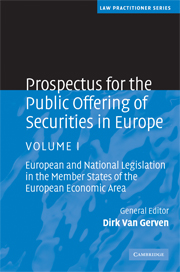 Prospectus for the Public Offering of Securities in Europe
Prospectus for the Public Offering of Securities in Europe Book contents
- Frontmatter
- Contents
- Contributors
- Preface
- Part I
- Part II Application in each Member State National reports for EU Member States
- 2 Belgium
- 3 Czech Republic
- 4 Denmark
- 5 Estonia
- 6 Greece
- 7 Hungary
- 8 Latvia
- 9 Lithuania
- 10 Luxembourg
- 11 The Netherlands
- 12 Poland
- 13 Portugal
- 14 Slovakia
- 15 United Kingdom
- Part III National reports for EEA Member States
- Part IV Annexes
- Index
13 - Portugal
from Part II - Application in each Member State National reports for EU Member States
Published online by Cambridge University Press: 18 December 2009
- Frontmatter
- Contents
- Contributors
- Preface
- Part I
- Part II Application in each Member State National reports for EU Member States
- 2 Belgium
- 3 Czech Republic
- 4 Denmark
- 5 Estonia
- 6 Greece
- 7 Hungary
- 8 Latvia
- 9 Lithuania
- 10 Luxembourg
- 11 The Netherlands
- 12 Poland
- 13 Portugal
- 14 Slovakia
- 15 United Kingdom
- Part III National reports for EEA Member States
- Part IV Annexes
- Index
Summary
Introduction
1. The ‘Prospectus Directive’ was transposed into Portuguese law through Decree-Law 52/2006 of 15 March 2006 (the Decree-Law).
With the transposition of the ‘Prospectus Directive’, the Decree-Law has introduced some substantial changes in the following Portuguese Legislation:
(i) Securities Code (the ‘SC’), approved by Decree-Law 486/99 of 13 November 1999;
(ii) Companies Code, approved by Decree-Law 262/86 of 3 November 1986;
(iii) Commercial Registry Code, approved by Decree-Law 403/86 of 3 December 1986;
(iv)Legal Regime on Mortgage Backed Securities, approved by Decree-Law 125/90 of 16 April 1990;
(v) Legal Regime on Cashiers Securities, approved by Decree-Law 408/91 of 17 October 1991;
(vi) Legal Regime on Collective Investment Institutions, approved by Decree-Law 252/2003 of 17 October 2003;
(vii) Legal Regime on Securitisation, approved by Decree-Law 453/99 of 5 November 1999;
(viii) Legal Regime on Commercial Notes, approved by Decree-Law 69/2004 of 25 March 2004.
The aforementioned statutes, and subsequent amendments, represent, together with the Decree-Law, the basic legal framework for all matters relating to prospectuses on public offers and the rules relating to the admission to trading of listed securities.
Please note, however, that the Decree-Law does not only cover prospectuses for public offers and the trading of listed securities. Additionally, it transposed into the Portuguese legal system Directive no. 2003/6/CE of the European Parliament and Council of 28 January 2003 regarding the abuse of privileged information and market manipulation, which are, however, beyond the scope of this report.
- Type
- Chapter
- Information
- Prospectus for the Public Offering of Securities in EuropeEuropean and National Legislation in the Member States of the European Economic Area, pp. 277 - 294Publisher: Cambridge University PressPrint publication year: 2008
